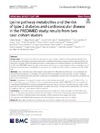Please use this identifier to cite or link to this item:
https://accedacris.ulpgc.es/jspui/handle/10553/70104
| Title: | Lysine pathway metabolites and the risk of type 2 diabetes and cardiovascular disease in the PREDIMED study: Results from two case-cohort studies | Authors: | Razquin, Cristina Ruiz-Canela, Miguel Clish, Clary B. Li, Jun Toledo, Estefania Dennis, Courtney Liang, Liming Salas-Huetos, Albert Pierce, Kerry A. Guasch-Ferré, Marta Corella, Dolores Ros, Emilio Estruch, Ramon Gómez-Gracia, Enrique Fitó, Montse Lapetra, Jose Romaguera, Dora Alonso-Gómez, Angel Serra-Majem, Lluis Salas-Salvadó, Jordi Hu, Frank B. Martínez-González, Miguel A. |
UNESCO Clasification: | 3206 Ciencias de la nutrición 320501 Cardiología |
Keywords: | Biomarkers Cardiovascular Disease Dietary Intervention Metabolites Type 2 Diabetes |
Issue Date: | 2019 | Journal: | Cardiovascular Diabetology | Abstract: | Background: The pandemic of cardiovascular disease (CVD) and type 2 diabetes (T2D) requires the identification of new predictor biomarkers. Biomarkers potentially modifiable with lifestyle changes deserve a special interest. Our aims were to analyze: (a) The associations of lysine, 2-aminoadipic acid (2-AAA) or pipecolic acid with the risk of T2D or CVD in the PREDIMED trial; (b) the effect of the dietary intervention on 1-year changes in these metabolites, and (c) whether the Mediterranean diet (MedDiet) interventions can modify the effects of these metabolites on CVD or T2D risk. Methods: Two unstratified case-cohort studies nested within the PREDIMED trial were used. For CVD analyses, we selected 696 non-cases and 221 incident CVD cases; for T2D, we included 610 non-cases and 243 type 2 diabetes incident cases. Metabolites were quantified using liquid chromatography-tandem mass spectrometry, at baseline and after 1-year of intervention. Results: In weighted Cox regression models, we found that baseline lysine (HR+1 SD increase = 1.26; 95% CI 1.06-1.51) and 2-AAA (HR+1 SD increase = 1.28; 95% CI 1.05-1.55) were both associated with a higher risk of T2D, but not with CVD. A significant interaction (p = 0.032) between baseline lysine and T2D on the risk of CVD was observed: subjects with prevalent T2D and high levels of lysine exhibited the highest risk of CVD. The intervention with MedDiet did not have a significant effect on 1-year changes of the metabolites. Conclusions: Our results provide an independent prospective replication of the association of 2-AAA with future risk of T2D. We show an association of lysine with subsequent CVD risk, which is apparently diabetes-dependent. No evidence of effects of MedDiet intervention on lysine, 2-AAA or pipecolic acid changes was found. Trial registration ISRCTN35739639; registration date: 05/10/2005; recruitment start date 01/10/2003 | URI: | https://accedacris.ulpgc.es/handle/10553/70104 | ISSN: | 1475-2840 | DOI: | 10.1186/s12933-019-0958-2 | Source: | Cardiovascular Diabetology, [ISSN 1475-2840], v. 18 (1), (Noviembre 2019) |
| Appears in Collections: | Artículos |
SCOPUSTM
Citations
42
checked on Jun 8, 2025
WEB OF SCIENCETM
Citations
46
checked on Feb 1, 2026
Page view(s)
59
checked on Jan 11, 2026
Download(s)
71
checked on Jan 11, 2026
Google ScholarTM
Check
Altmetric
Share
Export metadata
Items in accedaCRIS are protected by copyright, with all rights reserved, unless otherwise indicated.
